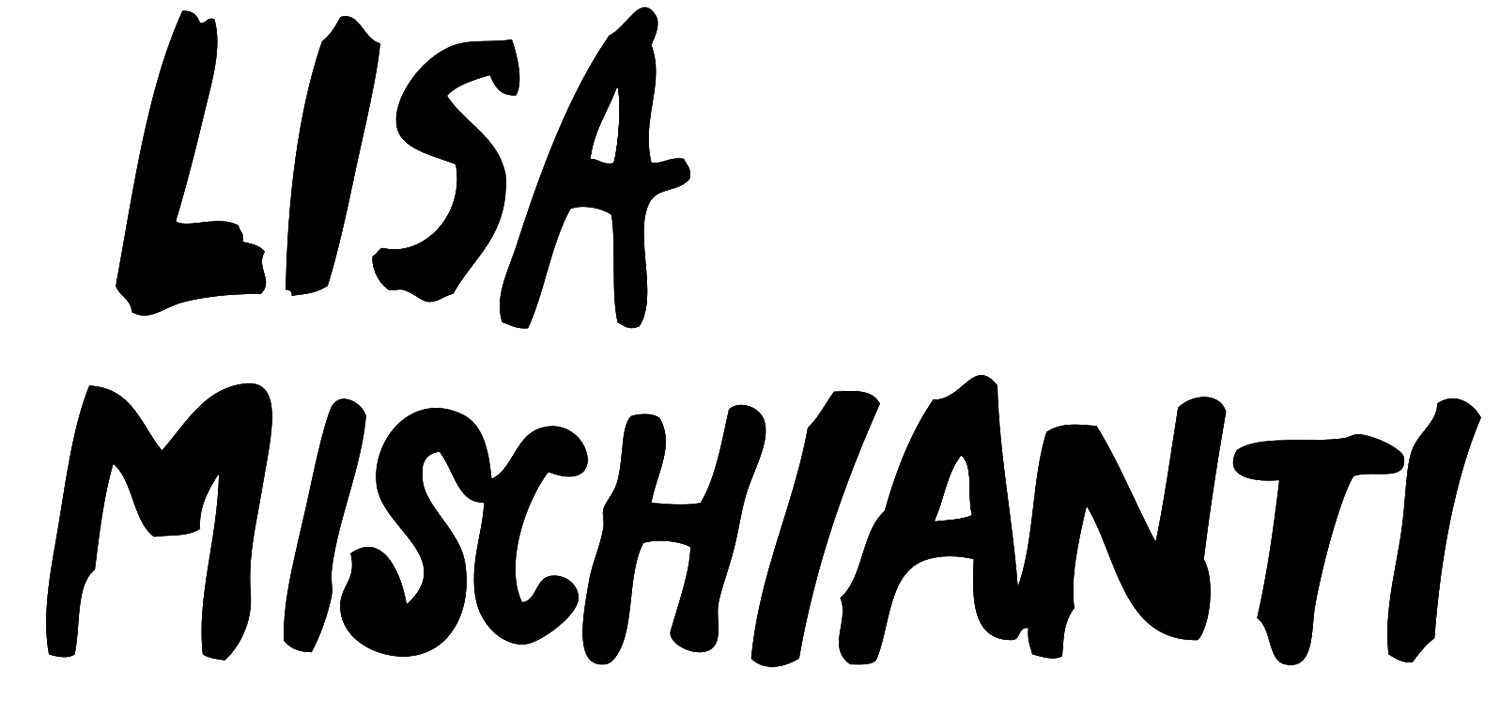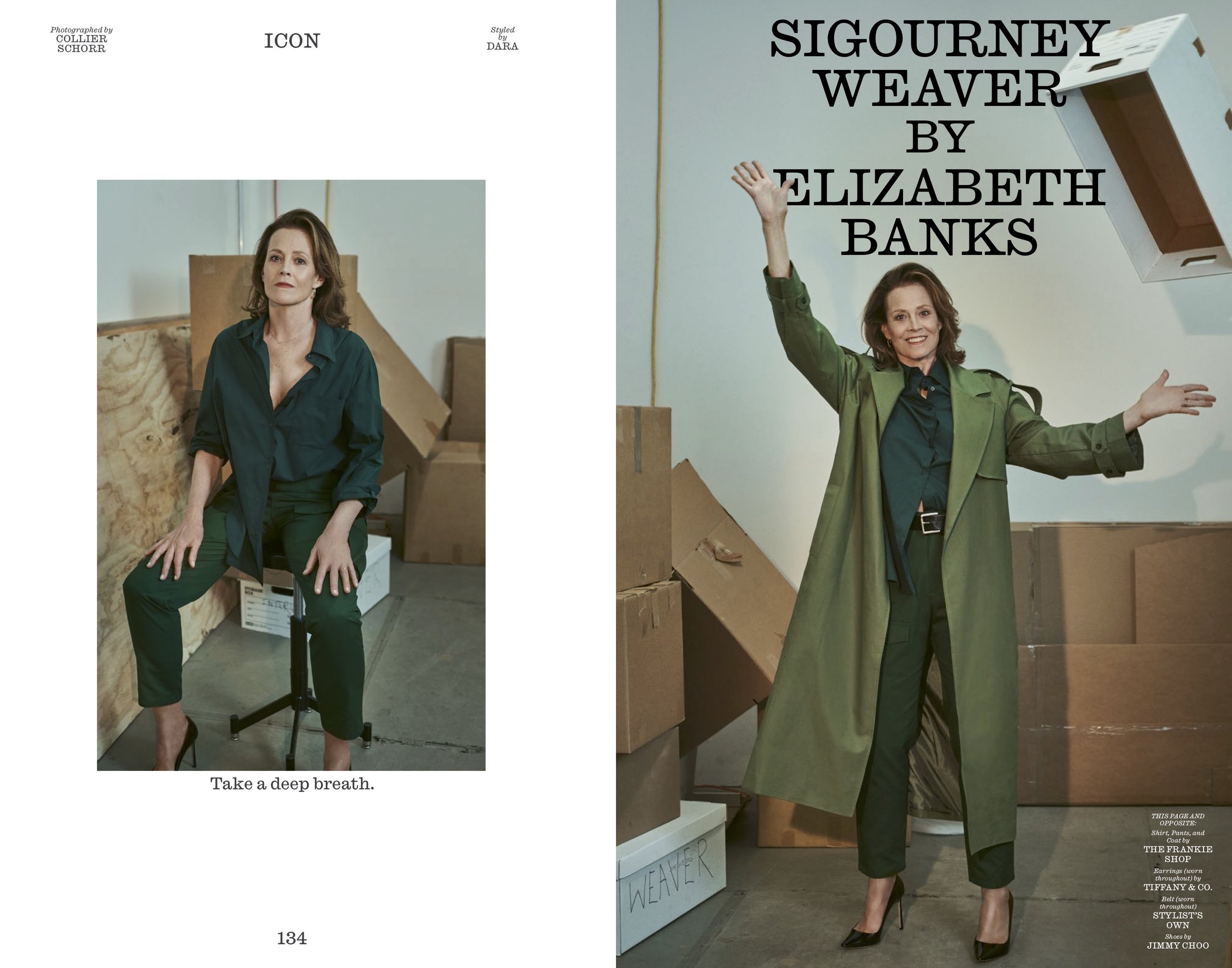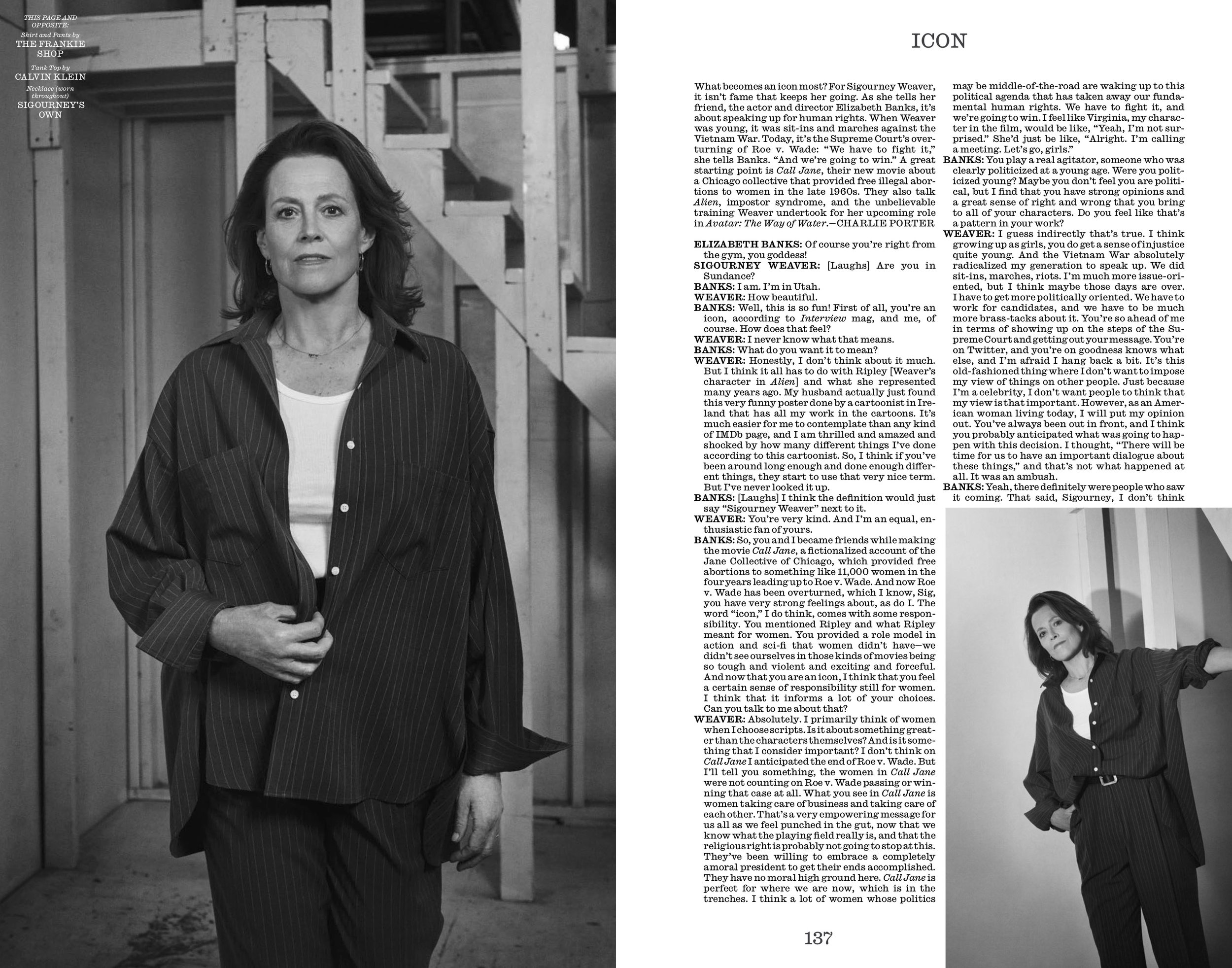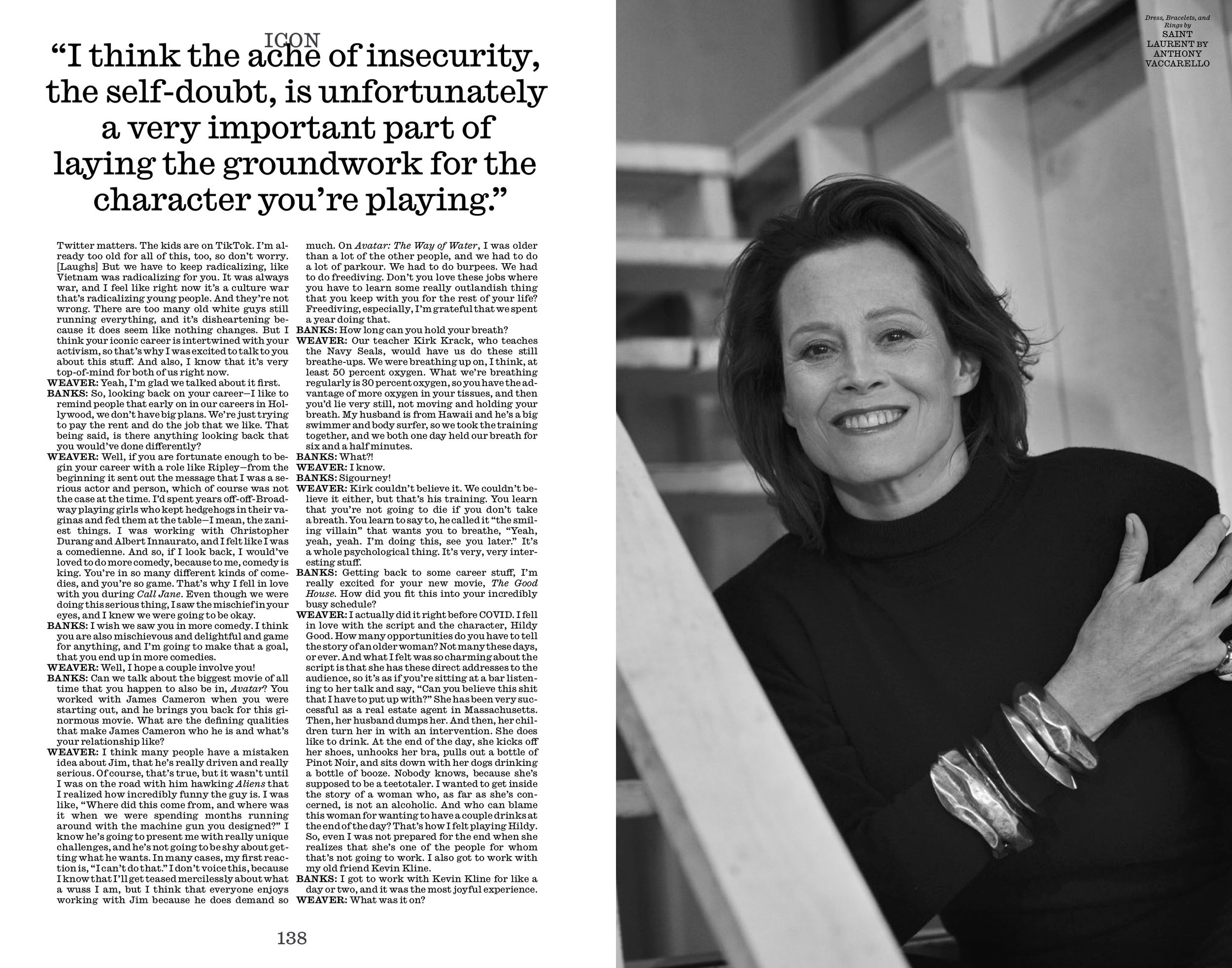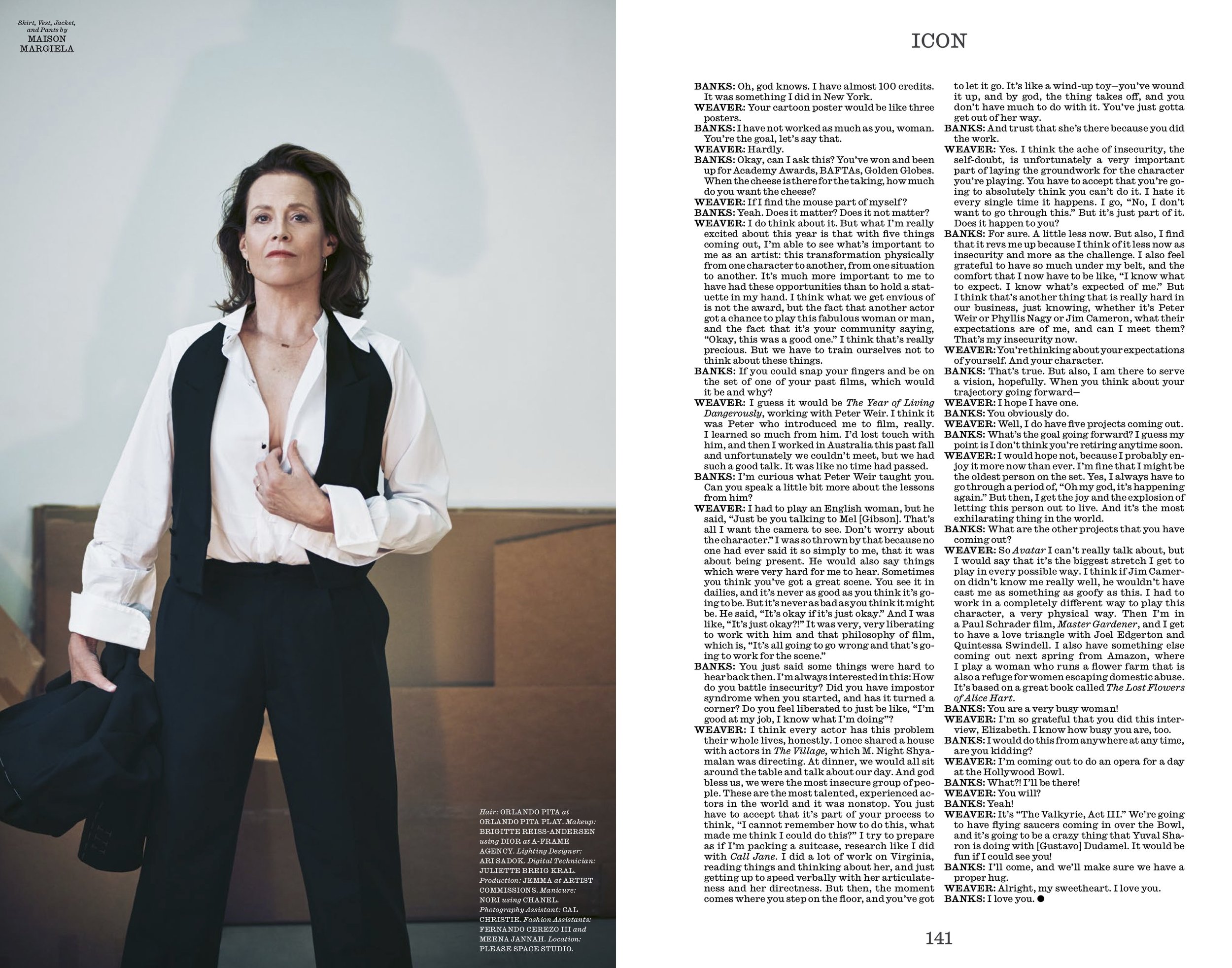SIGOURNEY WEAVER X ELIZABETH BANKS
What becomes an icon most? For Sigourney Weaver, it isn’t fame that keeps her going. As she tells her friend, the actor, and director Elizabeth Banks, it’s about speaking up for human rights. When Weaver was young, it was sit-ins and marches against the Vietnam War. Today, it’s the Supreme Court’s overturning of Roe v. Wade: “We have to fight it,” she tells Banks. “And we’re going to win.” A great starting point is Call Jane, their new movie about a Chicago collective that provided free illegal abortions to women in the late 1960s. They also talk Alien, impostor syndrome, and the unbelievable training Weaver undertook for her upcoming role in Avatar: The Way of Water. —CHARLIE PORTER
ELIZABETH BANKS: Of course you’re right from the gym, you goddess!
SIGOURNEY WEAVER: [Laughs] Are you in Sundance?
BANKS: I am. I’m in Utah.
WEAVER: How beautiful.
BANKS: Well, this is so fun! First of all, you’re an icon, according to Interview mag, and me, of course. How does that feel?
WEAVER: I never know what that means.
BANKS: What do you want it to mean?
WEAVER: Honestly, I don’t think about it much. But I think it all has to do with Ripley [Weaver’s character in Alien] and what she represented many years ago. My husband actually just found this very funny poster done by a cartoonist in Ireland that has all my work in the cartoons. It’s much easier for me to contemplate than any kind of IMDb page, and I am thrilled and amazed and shocked by how many different things I’ve done according to this cartoonist. So, I think if you’ve been around long enough and done enough different things, they start to use that very nice term. But I’ve never looked it up.
BANKS:[Laughs] I think the definition would just say “Sigourney Weaver” next to it.
WEAVER: You’re very kind. And I’m an equal, enthusiastic fan of yours.
BANKS: So, you and I became friends while making the movie Call Jane, a fictionalized account of the Jane Collective of Chicago, which provided free abortions to something like 11,000 women in the four years leading up to Roe v. Wade. And now Roe v. Wade has been overturned, which I know, Sig, you have very strong feelings about, as do I. The word “icon,” I do think, comes with some responsibility. You mentioned Ripley and what Ripley meant for women. You provided a role model in action and sci-fi that women didn’t have—we didn’t see ourselves in those kinds of movies being so tough and violent and exciting and forceful. And now that you are an icon, I think that you feel a certain sense of responsibility still for women. I think that it informs a lot of your choices. Can you talk to me about that?
WEAVER: Absolutely. I primarily think of women when I choose scripts. Is it about something greater than the characters themselves? And is it something that I consider important? I don’t think on Call Jane I anticipated the end of Roe v. Wade. But I’ll tell you something, the women in Call Jane were not counting on Roe v. Wade passing or winning that case at all. What you see in Call Jane is women taking care of business and taking care of each other. That’s a very empowering message for us all as we feel punched in the gut, now that we know what the playing field really is, and that the religious right is probably not going to stop at this. They’ve been willing to embrace a completely amoral president to get their ends accomplished. They have no moral high ground here. Call Jane is perfect for where we are now, which is in the trenches. I think a lot of women whose politics may be middle-of-the-road are waking up to this political agenda that has taken away our fundamental human rights. We have to fight it, and we’re going to win. I feel like Virginia, my character in the film, would be like, “Yeah, I’m not surprised.” She’d just be like, “Alright. I’m calling a meeting. Let’s go, girls.”
BANKS: You play a real agitator, someone who was clearly politicized at a young age. Were you politicized young? Maybe you don’t feel you are political, but I find that you have strong opinions and a great sense of right and wrong that you bring to all of your characters. Do you feel like that’s a pattern in your work?
WEAVER: I guess indirectly that’s true. I think growing up as girls, you do get a sense of injustice quite young. And the Vietnam War absolutely radicalized my generation to speak up. We did sit-ins, marches, riots. I’m much more issue-oriented, but I think maybe those days are over. I have to get more politically oriented. We have to work for candidates, and we have to be much more brass-tacks about it. You’re so ahead of me in terms of showing up on the steps of the Supreme Court and getting out your message. You’re on Twitter, and you’re on goodness knows what else, and I’m afraid I hang back a bit. It’s this old-fashioned thing where I don’t want to impose my view of things on other people. Just because I’m a celebrity, I don’t want people to think that my view is that important. However, as an American woman living today, I will put my opinion out. You’ve always been out in front, and I think you probably anticipated what was going to happen with this decision. I thought, “There will be time for us to have an important dialogue about these things,” and that’s not what happened at all. It was an ambush.
BANKS: Yeah, there definitely were people who saw it coming. That said, Sigourney, I don’t think Twitter matters. The kids are on TikTok. I’m already too old for all of this, too, so don’t worry. [Laughs] But we have to keep radicalizing, like Vietnam was radicalizing for you. It was always war, and I feel like right now it’s a culture war that’s radicalizing young people. And they’re not wrong. There are too many old white guys still running everything, and it’s disheartening because it does seem like nothing changes. But I think your iconic career is intertwined with your activism, so that’s why I was excited to talk to you about this stuff. And also, I know that it’s very top-of-mind for both of us right now.
WEAVER: Yeah, I’m glad we talked about it first.
BANKS: So, looking back on your career—I like to remind people that early on in our careers in Hollywood, we don’t have big plans. We’re just trying to pay the rent and do the job that we like. That being said, is there anything looking back that you would’ve done differently?
WEAVER: Well, if you are fortunate enough to begin your career with a role like Ripley—from the beginning it sent out the message that I was a serious actor and person, which of course was not the case at the time. I’d spent years off-off-Broadway playing girls who kept hedgehogs in their vaginas and fed them at the table—I mean, the zaniest things. I was working with Christopher Durang and Albert Innaurato, and I felt like I was a comedienne. And so, if I look back, I would’ve loved to do more comedy, because to me, comedy is king. You’re in so many different kinds of comedies, and you’re so game. That’s why I fell in love with you during Call Jane. Even though we were doing this serious thing, I saw the mischief in your eyes, and I knew we were going to be okay.
BANKS: I wish we saw you in more comedy. I think you are also mischievous and delightful and game for anything, and I’m going to make that a goal, that you end up in more comedies.
WEAVER: Well, I hope a couple involve you!
BANKS: Can we talk about the biggest movie of all time that you happen to also be in, Avatar? You worked with James Cameron when you were starting out, and he brings you back for this ginormous movie. What are the defining qualities that make James Cameron who he is and what’s your relationship like?
WEAVER: I think many people have a mistaken idea about Jim, that he’s really driven and really serious. Of course, that’s true, but it wasn’t until I was on the road with him hawking aliens that I realized how incredibly funny the guy is. I was like, “Where did this come from, and where was it when we were spending months running around with the machine gun you designed?” I know he’s going to present me with really unique challenges, and he’s not going to be shy about getting what he wants. In many cases, my first reaction is, “I can’t do that.” I don’t voice this, because I know that I’ll get teased mercilessly about what a wuss I am, but I think that everyone enjoys working with Jim because he does demand so much. On Avatar: The Way of Water, I was older than a lot of the other people, and we had to do a lot of parkour. We had to do burpees. We had to do freediving. Don’t you love these jobs where you have to learn some really outlandish thing that you keep with you for the rest of your life? Freediving, especially, I’m grateful that we spent a year doing that.
BANKS: How long can you hold your breath?
WEAVER: Our teacher Kirk Krack, who teaches the Navy Seals, would have us do these still breathe-ups. We were breathing up on, I think, at least 50 percent oxygen. What we’re breathing regularly is 30 percent oxygen, so you have the advantage of more oxygen in your tissues, and then you’d lie very still, not moving and holding your breath. My husband is from Hawaii and he’s a big swimmer and body surfer, so we took the training together, and we both one day held our breath for six and a half minutes.
BANKS: What?!
WEAVER: I know.
BANKS: Sigourney!
WEAVER: Kirk couldn’t believe it. We couldn’t believe it either, but that’s his training. You learn that you’re not going to die if you don’t take a breath. You learn to say to, he called it “the smiling villain” that wants you to breathe, “Yeah, yeah, yeah. I’m doing this, see you later.” It’s a whole psychological thing. It’s very, very interesting stuff.
BANKS: Getting back to some career stuff, I’m really excited for your new movie, The Good House. How did you fit this into your incredibly busy schedule?
WEAVER: I actually did it right before COVID. I fell in love with the script and the character, Hildy Good. How many opportunities do you have to tell the story of an older woman? Not many these days, or ever. And what I felt was so charming about the script is that she has these direct addresses to the audience, so it’s as if you’re sitting at a bar listening to her talk and say, “Can you believe this shit that I have to put up with?” She has been very successful as a real estate agent in Massachusetts. Then, her husband dumps her. And then, her children turn her in with an intervention. She does like to drink. At the end of the day, she kicks off her shoes, unhooks her bra, pulls out a bottle of Pinot Noir, and sits down with her dogs drinking a bottle of booze. Nobody knows, because she’s supposed to be a teetotaler. I wanted to get inside the story of a woman who, as far as she’s concerned, is not an alcoholic. And who can blame this woman for wanting to have a couple drinks at the end of the day? That’s how I felt playing Hildy. So, even I was not prepared for the end when she realizes that she’s one of the people for whom that’s not going to work. I also got to work with my old friend Kevin Kline.
BANKS: I got to work with Kevin Kline for like a day or two, and it was the most joyful experience.
WEAVER: What was it on?
BANKS: Oh, god knows. I have almost 100 credits. It was something I did in New York.
WEAVER: Your cartoon poster would be like three posters.
BANKS: I have not worked as much as you, woman. You’re the goal, let’s say that.
WEAVER: Hardly.
BANKS: Okay, can I ask this? You’ve won and been up for Academy Awards, BAFTAs, Golden Globes. When the cheese is there for the taking, how much do you want the cheese?
WEAVER: If I find the mouse part of myself?
BANKS: Yeah. Does it matter? Does it not matter?
WEAVER: I do think about it. But what I’m really excited about this year is that with five things coming out, I’m able to see what’s important to me as an artist: this transformation physically from one character to another, from one situation to another. It’s much more important to me to have had these opportunities than to hold a statuette in my hand. I think what we get envious of is not the award, but the fact that another actor got a chance to play this fabulous woman or man, and the fact that it’s your community saying, “Okay, this was a good one.” I think that’s really precious. But we have to train ourselves not to think about these things.
BANKS: If you could snap your fingers and be on the set of one of your past films, which would it be and why?
WEAVER: I guess it would be The Year of Living Dangerously, working with Peter Weir. I think it was Peter who introduced me to film, really. I learned so much from him. I’d lost touch with him, and then I worked in Australia this past fall and unfortunately, we couldn’t meet, but we had such a good talk. It was like no time had passed.
BANKS: I’m curious what Peter Weir taught you. Can you speak a little bit more about the lessons from him?
WEAVER: I had to play an English woman, but he said, “Just be you talking to Mel [Gibson]. That’s all I want the camera to see. Don’t worry about the character.” I was so thrown by that because no one had ever said it so simply to me, that it was about being present. He would also say things which were very hard for me to hear. Sometimes you think you’ve got a great scene. You see it in dailies, and it’s never as good as you think it’s going to be. But it’s never as bad as you think it might be. He said, “It’s okay if it’s just okay.” And I was like, “It’s just okay?!” It was very, very liberating to work with him and that philosophy of film, which is, “It’s all going to go wrong and that’s going to work for the scene.”
BANKS: You just said some things were hard to hear back then. I’m always interested in this: How do you battle insecurity? Did you have impostor syndrome when you started, and has it turned a corner? Do you feel liberated to just be like, “I’m good at my job, I know what I’m doing”?
WEAVER: I think every actor has this problem their whole lives, honestly. I once shared a house with actors in The Village, which M. Night Shyamalan was directing. At dinner, we would all sit around the table and talk about our day. And god bless us, we were the most insecure group of people. These are the most talented, experienced actors in the world and it was nonstop. You just have to accept that it’s part of your process to think, “I cannot remember how to do this, what made me think I could do this?” I try to prepare as if I’m packing a suitcase, research like I did with Call Jane. I did a lot of work on Virginia, reading things and thinking about her, and just getting up to speed verbally with her articulateness and her directness. But then, the moment comes where you step on the floor, and you’ve got to let it go. It’s like a wind-up toy—you’ve wound it up, and by god, the thing takes off, and you don’t have much to do with it. You’ve just gotta get out of her way.
BANKS: And trust that she’s there because you did the work.
WEAVER: Yes. I think the ache of insecurity, the self-doubt, is unfortunately a very important part of laying the groundwork for the character you’re playing. You have to accept that you’re going to absolutely think you can’t do it. I hate it every single time it happens. I go, “No, I don’t want to go through this.” But it’s just part of it. Does it happen to you?
BANKS: For sure. A little less now. But also, I find that it revs me up because I think of it less now as insecurity and more as the challenge. I also feel grateful to have so much under my belt, and the comfort that I now have to be like, “I know what to expect. I know what’s expected of me.” But I think that’s another thing that is really hard in our business, just knowing, whether it’s Peter Weir or Phyllis Nagy or Jim Cameron, what their expectations are of me, and can I meet them? That’s my insecurity now.
WEAVER: You’re thinking about your expectations of yourself. And your character.
BANKS: That’s true. But also, I am there to serve a vision, hopefully. When you think about your trajectory going forward—
WEAVER: I hope I have one.
BANKS: You obviously do.
WEAVER: Well, I do have five projects coming out.
BANKS: What’s the goal going forward? I guess my point is I don’t think you’re retiring anytime soon.
WEAVER: I would hope not, because I probably enjoy it more now than ever. I’m fine that I might be the oldest person on the set. Yes, I always have to go through a period of, “Oh my god, it’s happening again.” But then, I get the joy and the explosion of letting this person out to live. And it’s the most exhilarating thing in the world.
BANKS: What are the other projects that you have coming out?
WEAVER: So Avatar I can’t really talk about, but I would say that it’s the biggest stretch I get to play in every possible way. I think if Jim Cameron didn’t know me really well, he wouldn’t have cast me as something as goofy as this. I had to work in a completely different way to play this character, a very physical way. Then I’m in a Paul Schrader film, Master Gardener, and I get to have a love triangle with Joel Edgerton and Quintessa Swindell. I also have something else coming out next spring from Amazon, where I play a woman who runs a flower farm that is also a refuge for women escaping domestic abuse. It’s based on a great book called The Lost Flowers of Alice Hart.
BANKS: You are a very busy woman!
WEAVER: I’m so grateful that you did this interview, Elizabeth. I know how busy you are, too.
BANKS: I would do this from anywhere at any time, are you kidding?
WEAVER: I’m coming out to do an opera for a day at the Hollywood Bowl.
BANKS: What?! I’ll be there!
WEAVER: You will?
BANKS: Yeah!
WEAVER: It’s “The Valkyrie, Act III.” We’re going to have flying saucers coming in over the Bowl, and it’s going to be a crazy thing that Yuval Sharon is doing with [Gustavo] Dudamel. It would be fun if I could see you!
BANKS: I’ll come, and we’ll make sure we have a proper hug.
WEAVER: Alright, my sweetheart. I love you.
BANKS: I love you.
